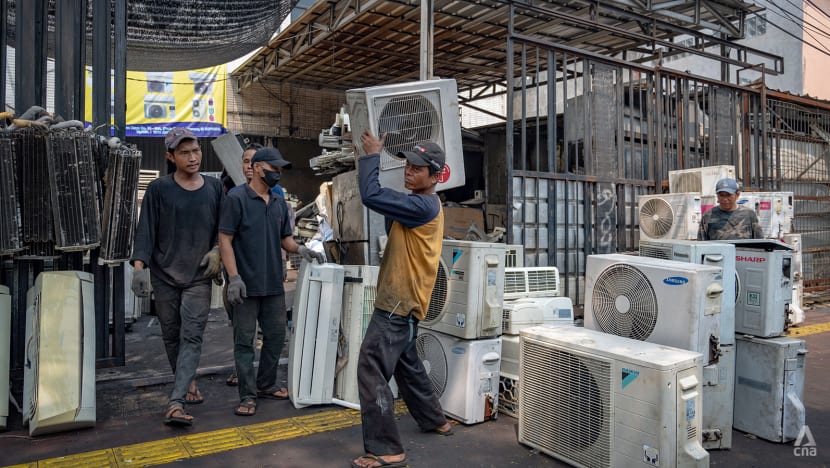Inefficient air-cons are being dumped in Southeast Asia. That’s costly for consumers and the climate
Millions of inefficient air-cons are being sold in Southeast Asia. But governments can put a stop to it - and help consumers save money in the longer term.

In Indonesia, 97 per cent of room air-cons sold are inefficient, according to the non-governmental organisation CLASP. (Photo: CNA/Danang Wisanggeni)
This audio is AI-generated.
JAKARTA: Air-conditioner technician Riki has been on a hot streak lately.
In his eight years on the job, the 25-year-old has typically received about five orders a day to install or repair air-cons.
But in the last two months, business has shot up and Riki now services up to 12 customers a day.
The reason: A prolonged dry season that has seen temperatures hit nearly 40 degrees Celsius in some places such as South Tangerang in the Greater Jakarta metropolitan area.
Riki, who goes by one name, now earns about 300,000 rupiah (US$19) a day, double his previous income. “Thank God there’s a lot of work. I’m happy,” he said.
Air-cons bring cool relief to Indonesians and others in the tropics, especially during hot spells. But most air-cons that Southeast Asians are buying are inefficient energy guzzlers, recent research has found.
They may also be obsolete in the countries that are exporting them, according to a report by non-governmental organisation (NGO) CLASP, which focuses on research and promotion of appliance efficiency and energy access.
Some of the appliances also contain refrigerants with high global warming potential, which contribute to climate change, strain national energy grids, and burden consumers with higher energy bills.
Experts told CNA if the government does not take stringent actions, Indonesia will continue to be a dumping ground for non-efficient air-cons.

WHAT IS A DUMPED AIR-CONDITIONER?
Dumped air-cons refer to those produced by various brands that do not meet the minimum energy performance standards (MEPS) in the brands' own domestic markets. They end up being exported to places with less stringent standards.
In its study published in September, CLASP examined the sale of inefficient room air-cons in Indonesia, Malaysia, the Philippines, Singapore, Thailand and Vietnam.
It found that out of 8.3 million units sold in the six countries in 2021, nearly three in four, or 6.2 million units, were of low efficiency.
Indonesia and the Philippines were the most exposed to dated technology, with 97 per cent and 78 per cent of room air-cons sold in the two countries respectively deemed inefficient. The figure in Malaysia, Thailand and Vietnam was around 60 per cent.
In Singapore, 21 per cent of total sales were low-efficiency models.
“Indonesia’s market is the least efficient out of the six countries in the region,” concluded Ms Lina Kelpsaite, CLASP’s manager from the climate team based in Washington, DC.
The study did not examine the cause of this in detail, but Ms Kelpsaite said there could be demand for less expensive air-cons, which tend to be less energy efficient.
“Indonesia is vast, with different purchasing power (among its people),” explained Mdm Nanik Rahmawati, CLASP’s Indonesian programme manager.
The MEPS in the manufacturing countries tend to be higher than in Indonesia, so some air-cons may qualify to be sold in Indonesia, she added.
In 2017, the Indonesian Ministry of Energy and Mineral Resources issued a regulation requiring domestic producers and air-con importers to include an energy-saving mark.
The label ranges from one to four stars, with the latter indicating the highest level of energy efficiency.

However, CNA found some air-cons without any label when it visited several electronic shops in Jakarta.
Prices also differed greatly. Those without any label cost about 1.8 million to 2 million rupiah, while those with two stars cost about 3 million rupiah. The ones with four stars were priced above 5 million rupiah.
WHO’S DUMPING?
Most brands supplying inefficient air-cons to Southeast Asia are multinational firms headquartered in China, South Korea, Japan and the United States. Most of these air-cons sold in Southeast Asia are also produced in the region.
Just under 30 per cent of the inefficient air-cons were imported from outside Southeast Asia. The bulk of these were from China, of which about 93 per cent did not meet China’s efficiency requirements.
Some 59 per cent of exports from South Korea to Southeast Asia did not meet the requirements there, and 21 per cent of air-cons exported from Japan were below the brands’ home-country requirements.

BAD FOR THE CLIMATE, AND THE POCKET
With record-high temperatures hitting Indonesia and many parts of the world this year, demand for air-conditioning will increase.
Climate-warming fossil fuels generate the bulk of electricity in Indonesia – which means energy-guzzling air-con leads to increased carbon emissions.
CLASP’s report showed if all six countries in its study disallowed dumping, they would cut more than 1 billion metric tons of carbon dioxide over 25 years and save US$148 billion for consumers.
This would also make an impact on Indonesia’s climate targets. In 2021, the country’s energy sector emissions amounted to around 600 million tonnes of carbon dioxide, making it the world’s ninth-largest emitter, according to data from the International Energy Agency (IEA).
Indonesia aims to independently reduce emissions by 29 per cent by the end of this decade, or by 41 per cent with international support.
For the Indonesian consumer, a more efficient air-con could lead to energy savings of about US$846 in eight years, offsetting its higher price.
This amount was derived by comparing the most common air-con unit available in Indonesia with another model that nearly met China’s current efficiency requirements, according to CLASP.
Its calculation was based on Indonesia's current electricity tariff of around US$0.10/kWh. The air-con models picked by CLASP have comparable capacities and features.
The study’s findings show that energy efficiency is crucial to reducing greenhouse gas emissions and addressing the climate crisis, said Mr Ahmad Ashov Birry, programme director at the Jakarta-based NGO Trend Asia, which focuses on sustainable energy.
“The Indonesian government must not be negligent and must increase supervision and enforce existing regulations regarding MEPS and energy-saving labelling,” he said.
The government should put a stop to dumping, as well as air-con manufacturers’ “double standards”, Mr Ahmad added.

HIGHER STANDARDS, CREATING AWARENESS
Consumers should also be given a greater nudge towards energy efficient air-cons and other appliances, he added.
For many households, upfront cost is the biggest consideration.
Mdm Farah Ananda and her husband David, who goes by one name, were shopping for an air-con recently and said they wanted an affordable unit.
“We need an air-con because of the hot weather here. So if an air-con's features make it energy efficient, we will consider buying it.
“But it is not the main factor. The main factor is the price,” said David.
His wife added: “If an air-con is energy efficient and within our budget, that would be ideal.”
Countries could offer incentives to consumers to buy more efficient air-cons, as well as to producers to make them, CLASP said in its report. Countries could also introduce preferential import policies for more efficient air-cons, while exporting countries can remove loopholes that allow the export of inefficient air-cons, it added.
The government is aware of the situation and told CNA that it will take measures to prevent Indonesia from being a dumping ground.
“We will strengthen the supervision of air-con products on the market and those imported in collaboration with the Ministry of Trade, and Customs from the Ministry of Finance,” said Mr Yudo Priaadi, director general of new, renewable energy and energy conservation at the Ministry of Energy and Mineral resources.
Indonesia will also review its MEPS periodically and increase it to match that of manufacturing countries. It will create campaigns to educate people.
"We will continue to work on solving this air-con dumping issue," he added.
Read this story in Bahasa Indonesia here.








